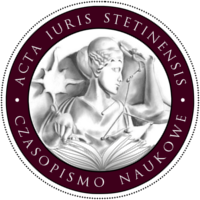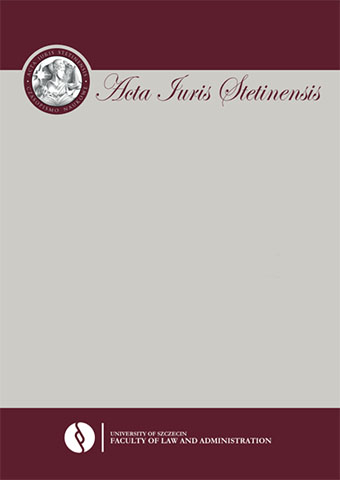| 1. | Aleksandrowicz, M. et al., Demokracja, teoria prawa, sądownictwo konstytucyjne. Księ-ga jubileuszowa dedykowana profesorowi zw. nauk prawnych Adamowi Jamrozowi z okazji pięćdziesięciolecia pracy zawodowej, Białystok 2018. |
| 2. | Amsterdam, S., The easy way out, Hachette 2016. |
| 3. | Aquinas, T., Summa Theologica, translated by Fathers of the English Dominican Provin- ce, 1947, https://www.ccel.org/a/aquinas/summa/ home.html. |
| 4. | Atwood, M., The handmaid’s tale, New York 2006. |
| 5. | Baker, J. R., Golding and Huxley: the fables of demonicpossession, “Twentieth Century Li¬terature” 2000, Vol. 46(3). |
| 6. | Baldwin, J., Another country, London 2001. |
| 7. | Baron, J.B., Law, literature, and the problems of interdisciplinarity, in: Kuisz, J. and Wą-sowicz, M. (eds.), Prawo i literatura. Antologia, Warszawa 2019. |
| 8. | Bix, B.H., Jurisprudence: theory and concept, London 1999. |
| 9. | Bix, B.H., Radbruch’s formula and conceptual analysis, “American Journal of Jurispru-dence” 2011, Vol. 56, https://ssrn.com/abstract=2017942. |
| 10. | Bruns, B., The symbolism of power in William Golding’s Lord of the Flies, Karlstad 2008, https://www.divaportal.org/smash/get/ diva2:132457/fulltext01. |
| 11. | Covell, C., The defence of natural law: a study of the ideas of law and justice in the wri- tings of Lon L. Fuller, Michael Oakeshot, F.A. Hayek, Ronald Dworkin, and John Fin- nis, London 1992. |
| 12. | Finnis, J., Fundamentals of ethics, Oxford 1983. |
| 13. | Finnis, J. et al., Nuclear deterrence, morality, and realism, Oxford 1987. |
| 14. | Fuller, L., The morality of law: revised edition, London 1969. |
| 15. | Genet, J., Our Lady of the Flowers, London 2019. |
| 16. | Genet, J., The thief’s journal, New York 2018. |
| 17. | Golding, W., Lord of the Flies, New York 1988. |
| 18. | Hamalainen, N., Literature and moral theory, 2015. |
| 19. | Isherwood, Ch., A single man, New York 2013. |
| 20. | Jastrun, M., Z pamiętnika byłego więźnia obozów koncentracyjnych, in: Jastrun, M., Wiersze zebrane, Warszawa 1956. |
| 21. | Kalpakgian, M., The right to life and the natural law, in: Koterski, J.W., (ed.), Life and earning IX: Proceedings of the ninth University Faculty for Life Conference, June 1999, Trinity International University, Deerfield, III, Washington 2000. |
| 22. | Kelsen, H., Pure theory of law, translated by Knight, M., Berkeley-Los Angeles 1967. |
| 23. | Koestler, A., Darkness at noon, New York 1941. |
| 24. | Kuisz, J. and Wąsowicz, M., Prawo i literatura. Antologia, Warszawa 2019. |
| 25. | Leszczyński, A., Przywileje partyjnej elity PRL: mieszkania, jachty, wczasy, 23.02.2015, Gazeta Wyborcza, https://wyborcza.pl/alehistoria/1,121681,17462415,Przywileje_ partyjnej_elity_PRL mieszkania jachty_.html. |
| 26. | Maritain, J., The rights of man and natural law, translated by Anson, D.C., New York 1943. |
| 27. | Marmor, A., Law in the age of pluralism, New York 2007. |
| 28. | Marzęcki, R., Młodzi Polacy myślą przede wszystkim o swoim bezpieczeństwie, 7.02.2018, Wszystko co najważniejsze, https://wszystkoconajwazniejsze.pl/radoslaw-marzecki- mlodzi-polacy-mysla-przede-wszystkim-o-swoim-bezpieczenstwie. |
| 29. | McDaniel, L., Breathless, New York 2009. |
| 30. | Miłosz, Cz., Zniewolony umysł, Kraków 2011. |
| 31. | Orwell, G., Nineteen eighty-four; translated by Mirkowicz, T., Kraków 2004. |
| 32. | Picoult, J., Mercy, London 2013. |
| 33. | Posner, R.A., Law and literature: a relation reargued, “Virginia Law Review” 1986, Vol. 72. |
| 34. | Potrzeszcz, J., Pozytywistyczna a niepozytywistyczna koncepcja prawa, “Roczniki Nauk Prawnych” 2005, Vol. XV, No. 2, http://czasopisma.tnkul.pl/index.php/rnp/article/ viewFile/2153/2261. |
| 35. | Tiefenbrun, S., Decoding international law: semiotics and the humanities, New York 2010. |
| 36. | Vidal, G., The city and the pillar; London 1997. |
| 37. | Wigmore, J.H., Introduction, in: Gest, J.M. (ed.), The lawyer in literature, London 1913. |
| 38. | Wojnowicz, W., Moskwa 2042, translated by Broniatowska, H., Warszawa 1992. |
| 39. | Woodward, K., The case for strict law and order, in: Swisher, C. (ed.), Readings on Lord of the Flies, San Diego 1997. |
| 40. | Wrona, J., Rola PZPR w państwie i społeczeństwie polskim, “Pamięć i Sprawiedliwość” 2018, No. 2(32). |
| 41. | Zumas, L., Red clocks, New York 2018. |






